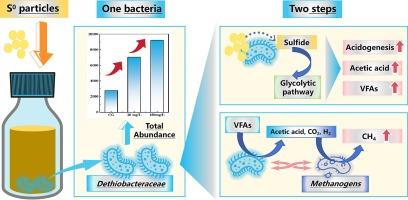通过添加元素硫加强厌氧消化。
IF 9.7
1区 环境科学与生态学
Q1 AGRICULTURAL ENGINEERING
引用次数: 0
摘要
本研究发现了一种在厌氧消化(AD)过程中提高有机基质甲烷(CH4)产量的新方法。即在厌氧消化系统中加入元素硫(S0)颗粒,促进元素硫歧化细菌、产酸细菌和产甲烷古细菌的协同生长,从而促进水解、产酸和产甲烷。以葡萄糖为模型有机底物的厌氧消化实验证实了这种厌氧消化增强途径的功效。结果表明,随着 S0 用量从 20 毫克/升到 300 毫克/升不等,AD 系统中的甲烷产量显著增加。在 20 毫克/升和 180 毫克/升的剂量下,出现了两个产气高峰,与对照组相比,CH4 的总产量分别增加了 2.1 倍和 2.5 倍。然而,当 S0 的用量超过 300 毫克/升时,就会出现抑制作用。研究分析了厌氧消化(AD)系统中 S 的化学状态、微生物群落和关键功能酶的丰度。结果表明,S0 的添加增加了 Dethiobacteraceae、Caldatribacterium、Anaerolineaceae、Methanobacterium 和 Methanosaeta 的相对丰度,并显著提高了关键功能酶的丰度,如脱氢酶、D-葡糖苷酶、丙酮酸合成酶和乙酰-CoA 去乙酰化酶。这些微生物和功能酶的富集与挥发性脂肪酸和 CH4 的产量呈强正相关,表明添加 S0 能有效提高厌氧消化(AD)过程中的甲烷生成。本文章由计算机程序翻译,如有差异,请以英文原文为准。

Enhancement of anaerobic digestion by adding elemental sulfur
In this study, a new approach to enhance methane (CH4) production from organic substrates in anaerobic digestion (AD) has been discovered. That is, the addition of elemental sulfur (S0) particles into the AD system promotes the synergistic growth of elemental sulfur disproportionation bacteria, acidogenic bacteria and methanogenic archaea, thus facilitating hydrolysis, acidogenesis and methanogenesis. The efficacy of this AD enhancement pathway was confirmed in AD experiments with glucose as a model organic substrate. The results demonstrated that CH4 production in the AD system increased considerably with S0 dosages ranging from 20 mg/L to 300 mg/L. Two gas production peaks appeared at dosages of 20 mg/L and 180 mg/L, where the total CH4 production increased by 2.1 times and 2.5 times, respectively compared with the control group. However, inhibitory effect was observed for S0 dosages above 300 mg/L. The chemical states of S, the microbial community and the abundance of key functional enzymes in the AD system were analyzed. The results showed that S0 addition increased the relative abundance of Dethiobacteraceae, Caldatribacterium, Anaerolineaceae, Methanobacterium and Methanosaeta and considerably increased the abundance of key functional enzymes, such as dehydrogenase, D-glucosidic glucosidase, pyruvate synthase and acetyl-CoA deacetylase. The enrichment of these microorganisms and functional enzymes was strongly positively correlated with the production of volatile fatty acids and CH4, demonstrating that S0 addition effectively enhances methanogenesis during AD.
求助全文
通过发布文献求助,成功后即可免费获取论文全文。
去求助
来源期刊

Bioresource Technology
工程技术-能源与燃料
CiteScore
20.80
自引率
19.30%
发文量
2013
审稿时长
12 days
期刊介绍:
Bioresource Technology publishes original articles, review articles, case studies, and short communications covering the fundamentals, applications, and management of bioresource technology. The journal seeks to advance and disseminate knowledge across various areas related to biomass, biological waste treatment, bioenergy, biotransformations, bioresource systems analysis, and associated conversion or production technologies.
Topics include:
• Biofuels: liquid and gaseous biofuels production, modeling and economics
• Bioprocesses and bioproducts: biocatalysis and fermentations
• Biomass and feedstocks utilization: bioconversion of agro-industrial residues
• Environmental protection: biological waste treatment
• Thermochemical conversion of biomass: combustion, pyrolysis, gasification, catalysis.
 求助内容:
求助内容: 应助结果提醒方式:
应助结果提醒方式:


